Leadership and Management in Service Industries: Analysis and Review
VerifiedAdded on 2023/01/23
|8
|2057
|93
Report
AI Summary
This report analyzes leadership and management principles within the service sector, using the Wa-Pila Hotel as a case study. It begins by introducing leadership and management concepts, highlighting the roles of leaders and managers. The report then delves into classical management theories and their application, different leadership styles, and the influence of internal and external factors on management. It examines the hard and soft skills essential for current and future management, and explores change management systems within service organizations, comparing examples like Thomas Cook and McDonald's. The report concludes by summarizing key findings and emphasizing the importance of effective leadership and management in achieving organizational success. The report also highlights the importance of team dynamics, conflict resolution, and effective communication in service sector operations.
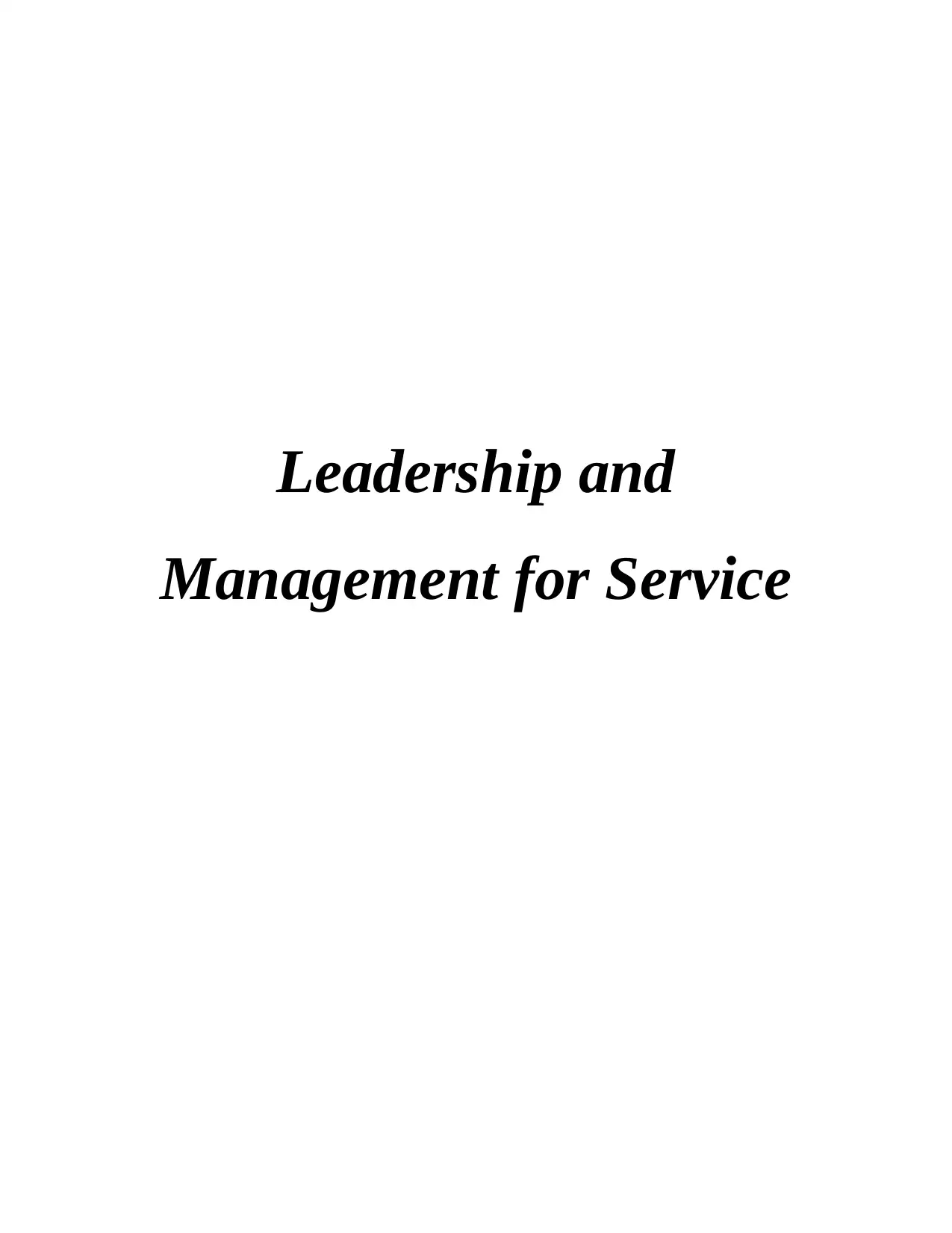
Leadership and
Management for Service
Management for Service
Paraphrase This Document
Need a fresh take? Get an instant paraphrase of this document with our AI Paraphraser
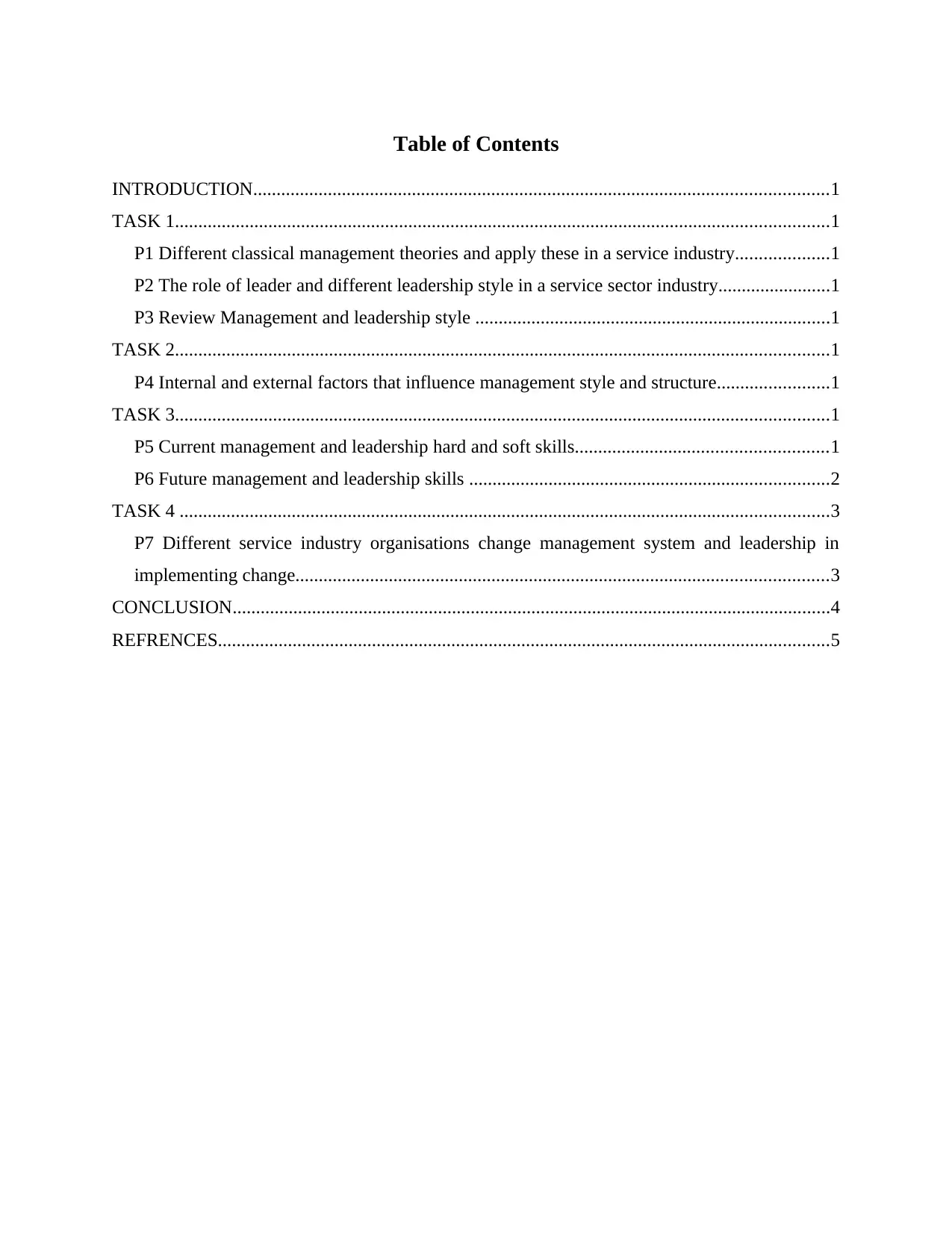
Table of Contents
INTRODUCTION...........................................................................................................................1
TASK 1............................................................................................................................................1
P1 Different classical management theories and apply these in a service industry....................1
P2 The role of leader and different leadership style in a service sector industry........................1
P3 Review Management and leadership style ............................................................................1
TASK 2............................................................................................................................................1
P4 Internal and external factors that influence management style and structure........................1
TASK 3............................................................................................................................................1
P5 Current management and leadership hard and soft skills......................................................1
P6 Future management and leadership skills .............................................................................2
TASK 4 ...........................................................................................................................................3
P7 Different service industry organisations change management system and leadership in
implementing change..................................................................................................................3
CONCLUSION................................................................................................................................4
REFRENCES...................................................................................................................................5
INTRODUCTION...........................................................................................................................1
TASK 1............................................................................................................................................1
P1 Different classical management theories and apply these in a service industry....................1
P2 The role of leader and different leadership style in a service sector industry........................1
P3 Review Management and leadership style ............................................................................1
TASK 2............................................................................................................................................1
P4 Internal and external factors that influence management style and structure........................1
TASK 3............................................................................................................................................1
P5 Current management and leadership hard and soft skills......................................................1
P6 Future management and leadership skills .............................................................................2
TASK 4 ...........................................................................................................................................3
P7 Different service industry organisations change management system and leadership in
implementing change..................................................................................................................3
CONCLUSION................................................................................................................................4
REFRENCES...................................................................................................................................5
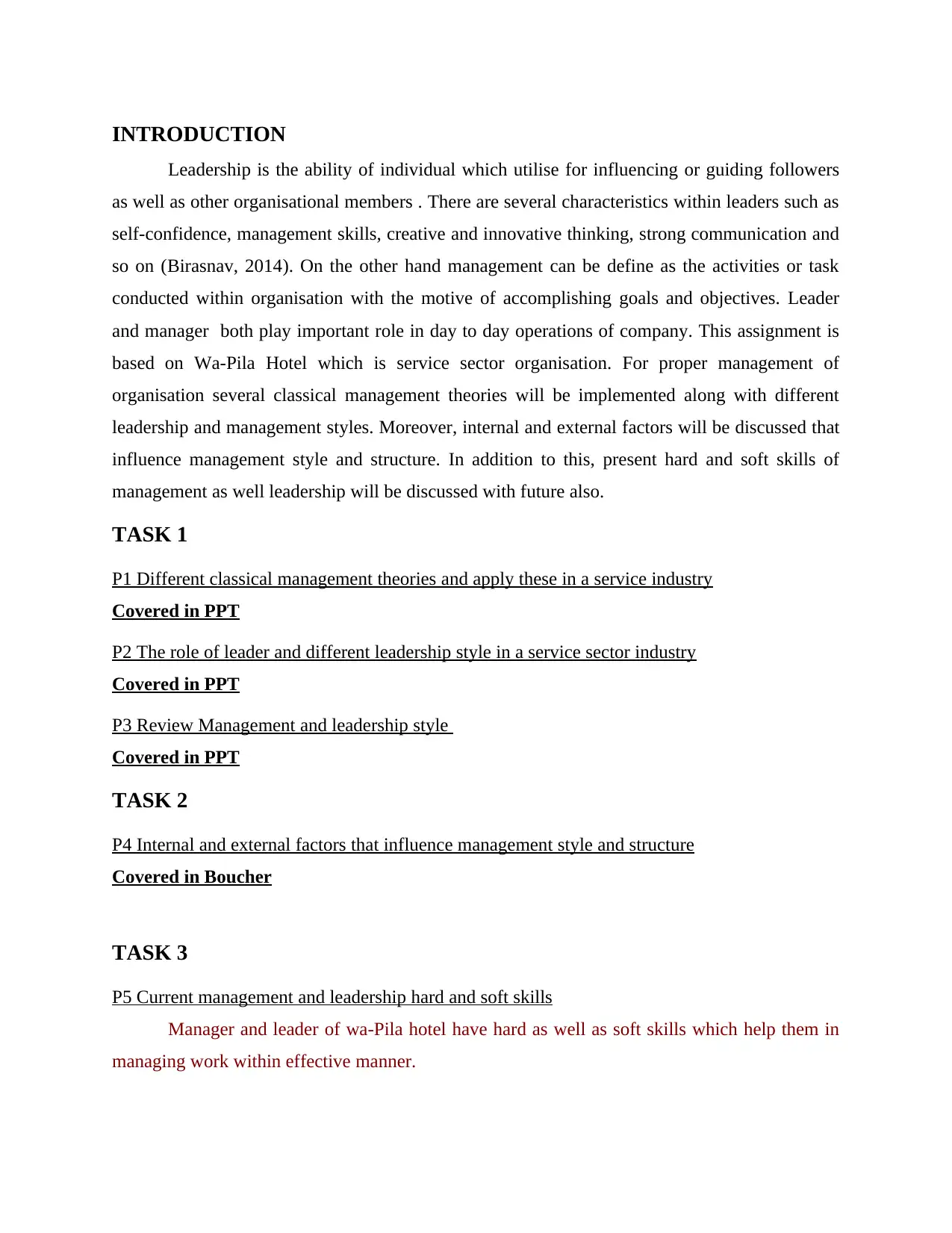
INTRODUCTION
Leadership is the ability of individual which utilise for influencing or guiding followers
as well as other organisational members . There are several characteristics within leaders such as
self-confidence, management skills, creative and innovative thinking, strong communication and
so on (Birasnav, 2014). On the other hand management can be define as the activities or task
conducted within organisation with the motive of accomplishing goals and objectives. Leader
and manager both play important role in day to day operations of company. This assignment is
based on Wa-Pila Hotel which is service sector organisation. For proper management of
organisation several classical management theories will be implemented along with different
leadership and management styles. Moreover, internal and external factors will be discussed that
influence management style and structure. In addition to this, present hard and soft skills of
management as well leadership will be discussed with future also.
TASK 1
P1 Different classical management theories and apply these in a service industry
Covered in PPT
P2 The role of leader and different leadership style in a service sector industry
Covered in PPT
P3 Review Management and leadership style
Covered in PPT
TASK 2
P4 Internal and external factors that influence management style and structure
Covered in Boucher
TASK 3
P5 Current management and leadership hard and soft skills
Manager and leader of wa-Pila hotel have hard as well as soft skills which help them in
managing work within effective manner.
Leadership is the ability of individual which utilise for influencing or guiding followers
as well as other organisational members . There are several characteristics within leaders such as
self-confidence, management skills, creative and innovative thinking, strong communication and
so on (Birasnav, 2014). On the other hand management can be define as the activities or task
conducted within organisation with the motive of accomplishing goals and objectives. Leader
and manager both play important role in day to day operations of company. This assignment is
based on Wa-Pila Hotel which is service sector organisation. For proper management of
organisation several classical management theories will be implemented along with different
leadership and management styles. Moreover, internal and external factors will be discussed that
influence management style and structure. In addition to this, present hard and soft skills of
management as well leadership will be discussed with future also.
TASK 1
P1 Different classical management theories and apply these in a service industry
Covered in PPT
P2 The role of leader and different leadership style in a service sector industry
Covered in PPT
P3 Review Management and leadership style
Covered in PPT
TASK 2
P4 Internal and external factors that influence management style and structure
Covered in Boucher
TASK 3
P5 Current management and leadership hard and soft skills
Manager and leader of wa-Pila hotel have hard as well as soft skills which help them in
managing work within effective manner.
⊘ This is a preview!⊘
Do you want full access?
Subscribe today to unlock all pages.

Trusted by 1+ million students worldwide
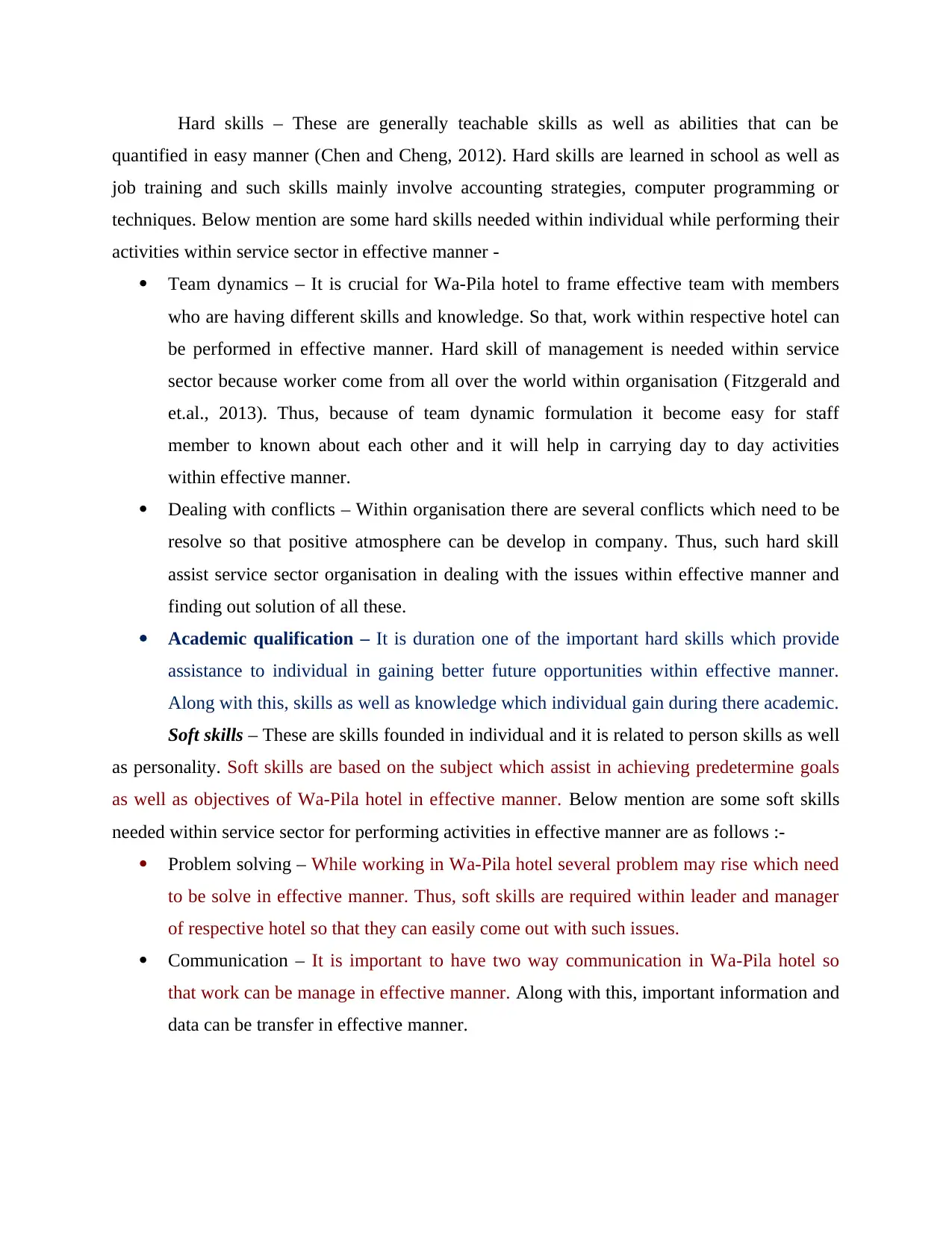
Hard skills – These are generally teachable skills as well as abilities that can be
quantified in easy manner (Chen and Cheng, 2012). Hard skills are learned in school as well as
job training and such skills mainly involve accounting strategies, computer programming or
techniques. Below mention are some hard skills needed within individual while performing their
activities within service sector in effective manner -
Team dynamics – It is crucial for Wa-Pila hotel to frame effective team with members
who are having different skills and knowledge. So that, work within respective hotel can
be performed in effective manner. Hard skill of management is needed within service
sector because worker come from all over the world within organisation (Fitzgerald and
et.al., 2013). Thus, because of team dynamic formulation it become easy for staff
member to known about each other and it will help in carrying day to day activities
within effective manner.
Dealing with conflicts – Within organisation there are several conflicts which need to be
resolve so that positive atmosphere can be develop in company. Thus, such hard skill
assist service sector organisation in dealing with the issues within effective manner and
finding out solution of all these.
Academic qualification – It is duration one of the important hard skills which provide
assistance to individual in gaining better future opportunities within effective manner.
Along with this, skills as well as knowledge which individual gain during there academic.
Soft skills – These are skills founded in individual and it is related to person skills as well
as personality. Soft skills are based on the subject which assist in achieving predetermine goals
as well as objectives of Wa-Pila hotel in effective manner. Below mention are some soft skills
needed within service sector for performing activities in effective manner are as follows :-
Problem solving – While working in Wa-Pila hotel several problem may rise which need
to be solve in effective manner. Thus, soft skills are required within leader and manager
of respective hotel so that they can easily come out with such issues.
Communication – It is important to have two way communication in Wa-Pila hotel so
that work can be manage in effective manner. Along with this, important information and
data can be transfer in effective manner.
quantified in easy manner (Chen and Cheng, 2012). Hard skills are learned in school as well as
job training and such skills mainly involve accounting strategies, computer programming or
techniques. Below mention are some hard skills needed within individual while performing their
activities within service sector in effective manner -
Team dynamics – It is crucial for Wa-Pila hotel to frame effective team with members
who are having different skills and knowledge. So that, work within respective hotel can
be performed in effective manner. Hard skill of management is needed within service
sector because worker come from all over the world within organisation (Fitzgerald and
et.al., 2013). Thus, because of team dynamic formulation it become easy for staff
member to known about each other and it will help in carrying day to day activities
within effective manner.
Dealing with conflicts – Within organisation there are several conflicts which need to be
resolve so that positive atmosphere can be develop in company. Thus, such hard skill
assist service sector organisation in dealing with the issues within effective manner and
finding out solution of all these.
Academic qualification – It is duration one of the important hard skills which provide
assistance to individual in gaining better future opportunities within effective manner.
Along with this, skills as well as knowledge which individual gain during there academic.
Soft skills – These are skills founded in individual and it is related to person skills as well
as personality. Soft skills are based on the subject which assist in achieving predetermine goals
as well as objectives of Wa-Pila hotel in effective manner. Below mention are some soft skills
needed within service sector for performing activities in effective manner are as follows :-
Problem solving – While working in Wa-Pila hotel several problem may rise which need
to be solve in effective manner. Thus, soft skills are required within leader and manager
of respective hotel so that they can easily come out with such issues.
Communication – It is important to have two way communication in Wa-Pila hotel so
that work can be manage in effective manner. Along with this, important information and
data can be transfer in effective manner.
Paraphrase This Document
Need a fresh take? Get an instant paraphrase of this document with our AI Paraphraser
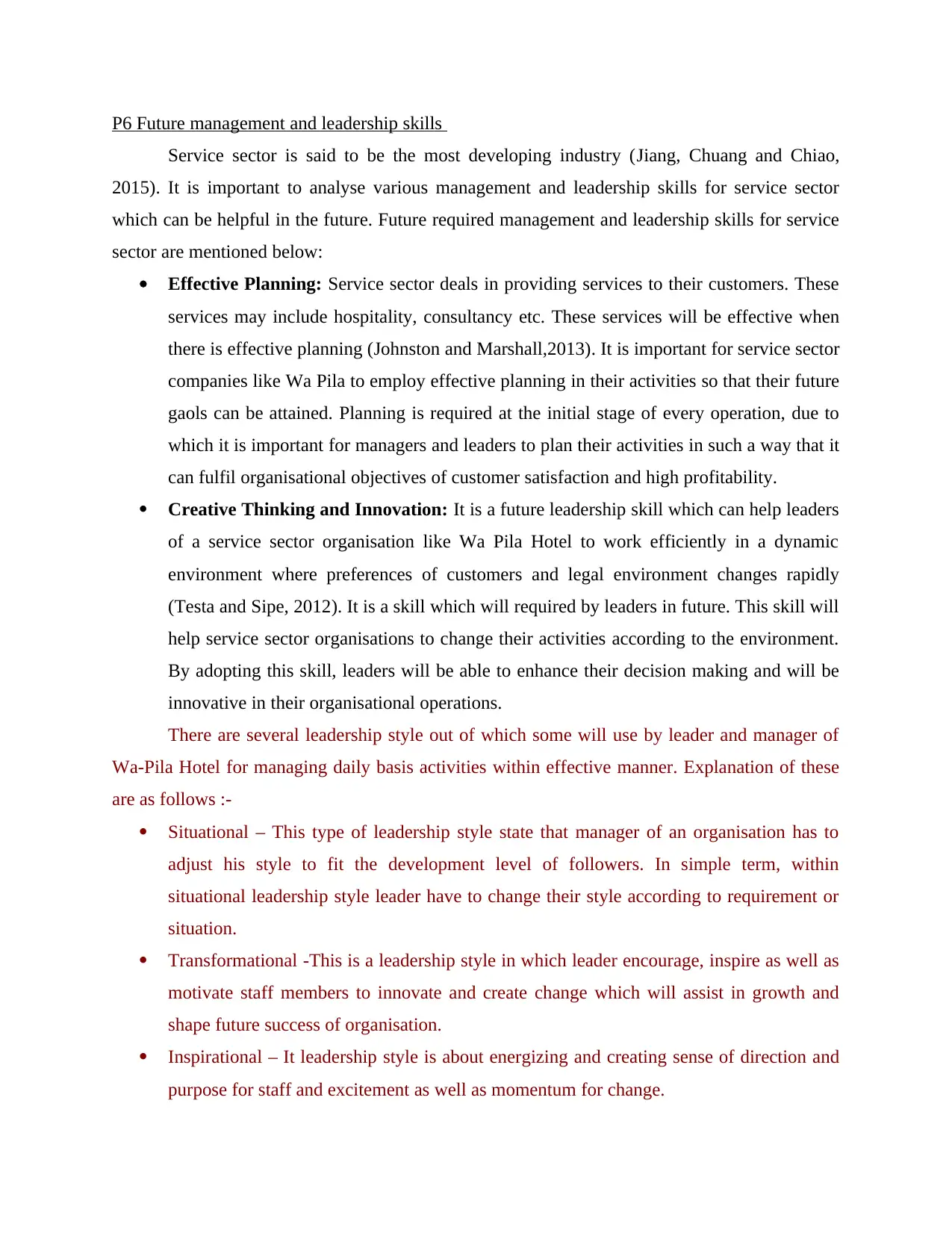
P6 Future management and leadership skills
Service sector is said to be the most developing industry (Jiang, Chuang and Chiao,
2015). It is important to analyse various management and leadership skills for service sector
which can be helpful in the future. Future required management and leadership skills for service
sector are mentioned below:
Effective Planning: Service sector deals in providing services to their customers. These
services may include hospitality, consultancy etc. These services will be effective when
there is effective planning (Johnston and Marshall,2013). It is important for service sector
companies like Wa Pila to employ effective planning in their activities so that their future
gaols can be attained. Planning is required at the initial stage of every operation, due to
which it is important for managers and leaders to plan their activities in such a way that it
can fulfil organisational objectives of customer satisfaction and high profitability.
Creative Thinking and Innovation: It is a future leadership skill which can help leaders
of a service sector organisation like Wa Pila Hotel to work efficiently in a dynamic
environment where preferences of customers and legal environment changes rapidly
(Testa and Sipe, 2012). It is a skill which will required by leaders in future. This skill will
help service sector organisations to change their activities according to the environment.
By adopting this skill, leaders will be able to enhance their decision making and will be
innovative in their organisational operations.
There are several leadership style out of which some will use by leader and manager of
Wa-Pila Hotel for managing daily basis activities within effective manner. Explanation of these
are as follows :-
Situational – This type of leadership style state that manager of an organisation has to
adjust his style to fit the development level of followers. In simple term, within
situational leadership style leader have to change their style according to requirement or
situation.
Transformational -This is a leadership style in which leader encourage, inspire as well as
motivate staff members to innovate and create change which will assist in growth and
shape future success of organisation.
Inspirational – It leadership style is about energizing and creating sense of direction and
purpose for staff and excitement as well as momentum for change.
Service sector is said to be the most developing industry (Jiang, Chuang and Chiao,
2015). It is important to analyse various management and leadership skills for service sector
which can be helpful in the future. Future required management and leadership skills for service
sector are mentioned below:
Effective Planning: Service sector deals in providing services to their customers. These
services may include hospitality, consultancy etc. These services will be effective when
there is effective planning (Johnston and Marshall,2013). It is important for service sector
companies like Wa Pila to employ effective planning in their activities so that their future
gaols can be attained. Planning is required at the initial stage of every operation, due to
which it is important for managers and leaders to plan their activities in such a way that it
can fulfil organisational objectives of customer satisfaction and high profitability.
Creative Thinking and Innovation: It is a future leadership skill which can help leaders
of a service sector organisation like Wa Pila Hotel to work efficiently in a dynamic
environment where preferences of customers and legal environment changes rapidly
(Testa and Sipe, 2012). It is a skill which will required by leaders in future. This skill will
help service sector organisations to change their activities according to the environment.
By adopting this skill, leaders will be able to enhance their decision making and will be
innovative in their organisational operations.
There are several leadership style out of which some will use by leader and manager of
Wa-Pila Hotel for managing daily basis activities within effective manner. Explanation of these
are as follows :-
Situational – This type of leadership style state that manager of an organisation has to
adjust his style to fit the development level of followers. In simple term, within
situational leadership style leader have to change their style according to requirement or
situation.
Transformational -This is a leadership style in which leader encourage, inspire as well as
motivate staff members to innovate and create change which will assist in growth and
shape future success of organisation.
Inspirational – It leadership style is about energizing and creating sense of direction and
purpose for staff and excitement as well as momentum for change.
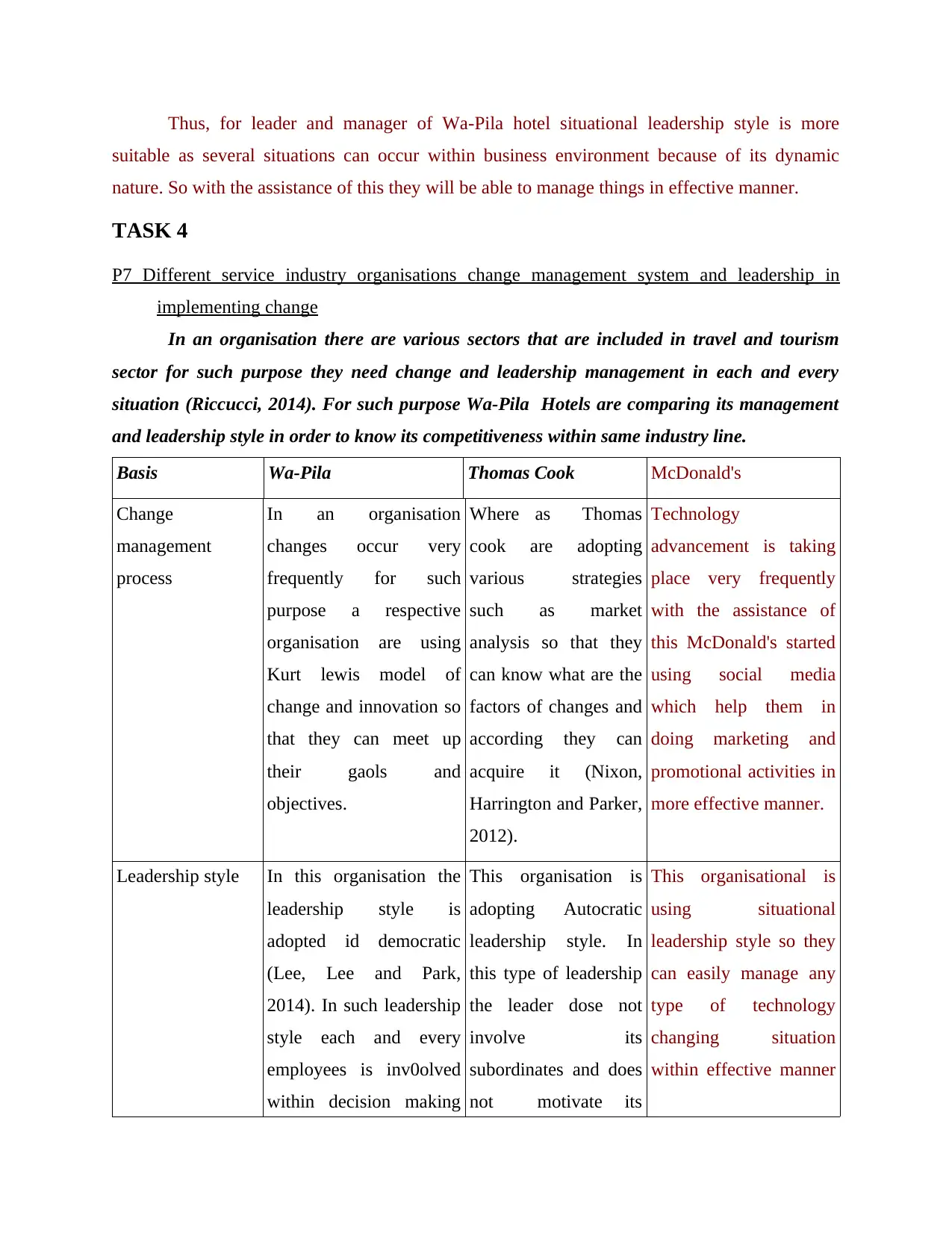
Thus, for leader and manager of Wa-Pila hotel situational leadership style is more
suitable as several situations can occur within business environment because of its dynamic
nature. So with the assistance of this they will be able to manage things in effective manner.
TASK 4
P7 Different service industry organisations change management system and leadership in
implementing change
In an organisation there are various sectors that are included in travel and tourism
sector for such purpose they need change and leadership management in each and every
situation (Riccucci, 2014). For such purpose Wa-Pila Hotels are comparing its management
and leadership style in order to know its competitiveness within same industry line.
Basis Wa-Pila Thomas Cook McDonald's
Change
management
process
In an organisation
changes occur very
frequently for such
purpose a respective
organisation are using
Kurt lewis model of
change and innovation so
that they can meet up
their gaols and
objectives.
Where as Thomas
cook are adopting
various strategies
such as market
analysis so that they
can know what are the
factors of changes and
according they can
acquire it (Nixon,
Harrington and Parker,
2012).
Technology
advancement is taking
place very frequently
with the assistance of
this McDonald's started
using social media
which help them in
doing marketing and
promotional activities in
more effective manner.
Leadership style In this organisation the
leadership style is
adopted id democratic
(Lee, Lee and Park,
2014). In such leadership
style each and every
employees is inv0olved
within decision making
This organisation is
adopting Autocratic
leadership style. In
this type of leadership
the leader dose not
involve its
subordinates and does
not motivate its
This organisational is
using situational
leadership style so they
can easily manage any
type of technology
changing situation
within effective manner
suitable as several situations can occur within business environment because of its dynamic
nature. So with the assistance of this they will be able to manage things in effective manner.
TASK 4
P7 Different service industry organisations change management system and leadership in
implementing change
In an organisation there are various sectors that are included in travel and tourism
sector for such purpose they need change and leadership management in each and every
situation (Riccucci, 2014). For such purpose Wa-Pila Hotels are comparing its management
and leadership style in order to know its competitiveness within same industry line.
Basis Wa-Pila Thomas Cook McDonald's
Change
management
process
In an organisation
changes occur very
frequently for such
purpose a respective
organisation are using
Kurt lewis model of
change and innovation so
that they can meet up
their gaols and
objectives.
Where as Thomas
cook are adopting
various strategies
such as market
analysis so that they
can know what are the
factors of changes and
according they can
acquire it (Nixon,
Harrington and Parker,
2012).
Technology
advancement is taking
place very frequently
with the assistance of
this McDonald's started
using social media
which help them in
doing marketing and
promotional activities in
more effective manner.
Leadership style In this organisation the
leadership style is
adopted id democratic
(Lee, Lee and Park,
2014). In such leadership
style each and every
employees is inv0olved
within decision making
This organisation is
adopting Autocratic
leadership style. In
this type of leadership
the leader dose not
involve its
subordinates and does
not motivate its
This organisational is
using situational
leadership style so they
can easily manage any
type of technology
changing situation
within effective manner
⊘ This is a preview!⊘
Do you want full access?
Subscribe today to unlock all pages.

Trusted by 1+ million students worldwide
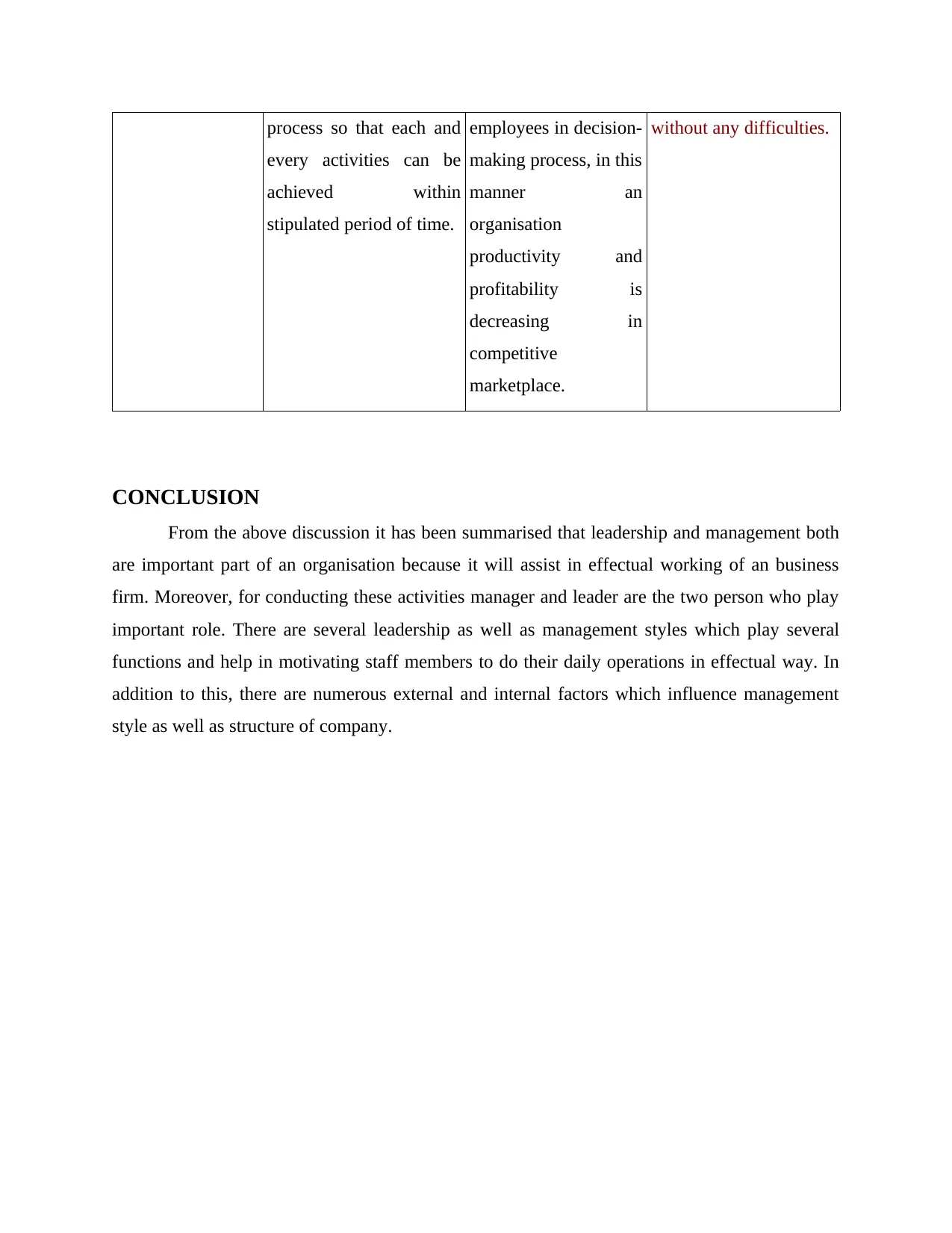
process so that each and
every activities can be
achieved within
stipulated period of time.
employees in decision-
making process, in this
manner an
organisation
productivity and
profitability is
decreasing in
competitive
marketplace.
without any difficulties.
CONCLUSION
From the above discussion it has been summarised that leadership and management both
are important part of an organisation because it will assist in effectual working of an business
firm. Moreover, for conducting these activities manager and leader are the two person who play
important role. There are several leadership as well as management styles which play several
functions and help in motivating staff members to do their daily operations in effectual way. In
addition to this, there are numerous external and internal factors which influence management
style as well as structure of company.
every activities can be
achieved within
stipulated period of time.
employees in decision-
making process, in this
manner an
organisation
productivity and
profitability is
decreasing in
competitive
marketplace.
without any difficulties.
CONCLUSION
From the above discussion it has been summarised that leadership and management both
are important part of an organisation because it will assist in effectual working of an business
firm. Moreover, for conducting these activities manager and leader are the two person who play
important role. There are several leadership as well as management styles which play several
functions and help in motivating staff members to do their daily operations in effectual way. In
addition to this, there are numerous external and internal factors which influence management
style as well as structure of company.
Paraphrase This Document
Need a fresh take? Get an instant paraphrase of this document with our AI Paraphraser
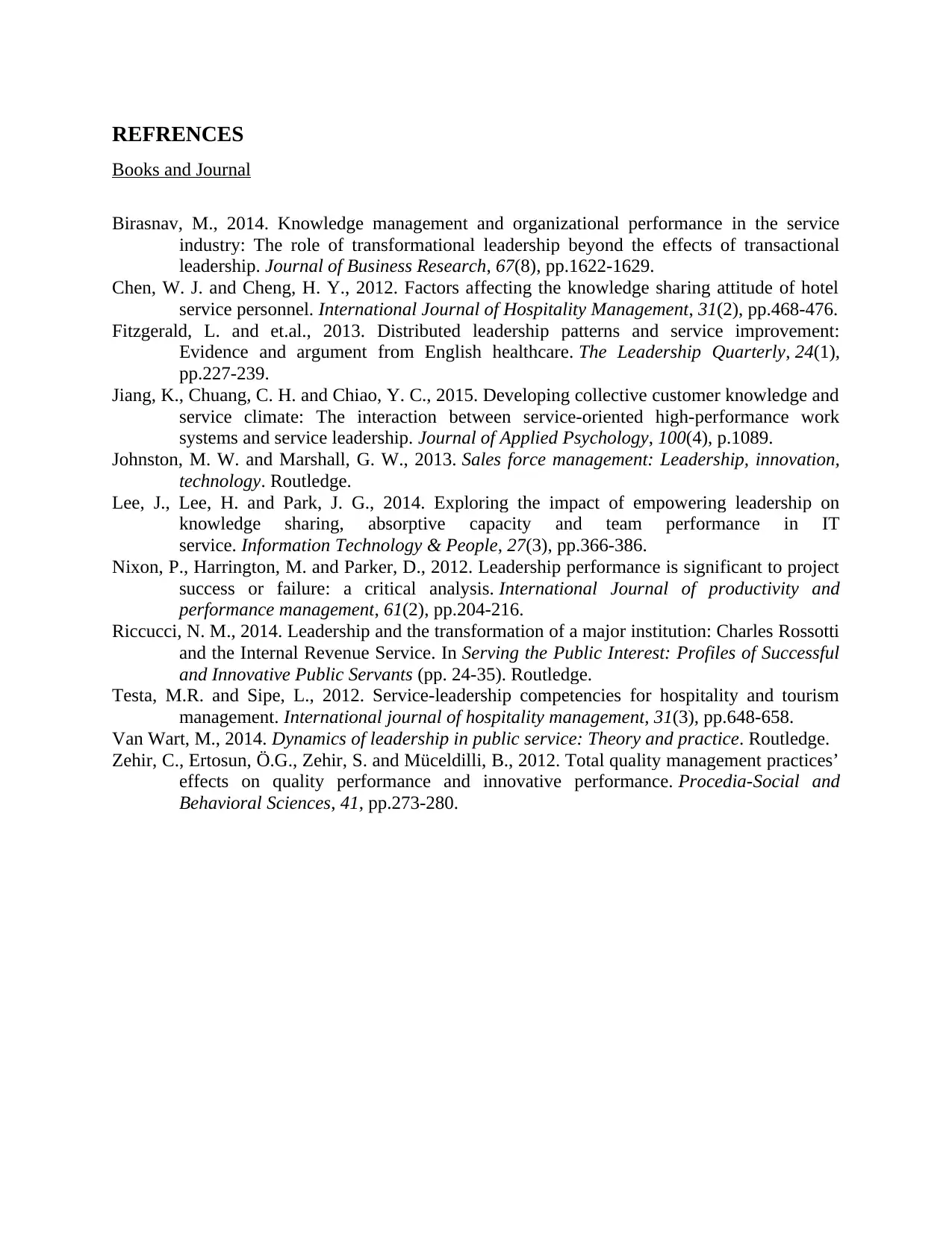
REFRENCES
Books and Journal
Birasnav, M., 2014. Knowledge management and organizational performance in the service
industry: The role of transformational leadership beyond the effects of transactional
leadership. Journal of Business Research, 67(8), pp.1622-1629.
Chen, W. J. and Cheng, H. Y., 2012. Factors affecting the knowledge sharing attitude of hotel
service personnel. International Journal of Hospitality Management, 31(2), pp.468-476.
Fitzgerald, L. and et.al., 2013. Distributed leadership patterns and service improvement:
Evidence and argument from English healthcare. The Leadership Quarterly, 24(1),
pp.227-239.
Jiang, K., Chuang, C. H. and Chiao, Y. C., 2015. Developing collective customer knowledge and
service climate: The interaction between service-oriented high-performance work
systems and service leadership. Journal of Applied Psychology, 100(4), p.1089.
Johnston, M. W. and Marshall, G. W., 2013. Sales force management: Leadership, innovation,
technology. Routledge.
Lee, J., Lee, H. and Park, J. G., 2014. Exploring the impact of empowering leadership on
knowledge sharing, absorptive capacity and team performance in IT
service. Information Technology & People, 27(3), pp.366-386.
Nixon, P., Harrington, M. and Parker, D., 2012. Leadership performance is significant to project
success or failure: a critical analysis. International Journal of productivity and
performance management, 61(2), pp.204-216.
Riccucci, N. M., 2014. Leadership and the transformation of a major institution: Charles Rossotti
and the Internal Revenue Service. In Serving the Public Interest: Profiles of Successful
and Innovative Public Servants (pp. 24-35). Routledge.
Testa, M.R. and Sipe, L., 2012. Service-leadership competencies for hospitality and tourism
management. International journal of hospitality management, 31(3), pp.648-658.
Van Wart, M., 2014. Dynamics of leadership in public service: Theory and practice. Routledge.
Zehir, C., Ertosun, Ö.G., Zehir, S. and Müceldilli, B., 2012. Total quality management practices’
effects on quality performance and innovative performance. Procedia-Social and
Behavioral Sciences, 41, pp.273-280.
Books and Journal
Birasnav, M., 2014. Knowledge management and organizational performance in the service
industry: The role of transformational leadership beyond the effects of transactional
leadership. Journal of Business Research, 67(8), pp.1622-1629.
Chen, W. J. and Cheng, H. Y., 2012. Factors affecting the knowledge sharing attitude of hotel
service personnel. International Journal of Hospitality Management, 31(2), pp.468-476.
Fitzgerald, L. and et.al., 2013. Distributed leadership patterns and service improvement:
Evidence and argument from English healthcare. The Leadership Quarterly, 24(1),
pp.227-239.
Jiang, K., Chuang, C. H. and Chiao, Y. C., 2015. Developing collective customer knowledge and
service climate: The interaction between service-oriented high-performance work
systems and service leadership. Journal of Applied Psychology, 100(4), p.1089.
Johnston, M. W. and Marshall, G. W., 2013. Sales force management: Leadership, innovation,
technology. Routledge.
Lee, J., Lee, H. and Park, J. G., 2014. Exploring the impact of empowering leadership on
knowledge sharing, absorptive capacity and team performance in IT
service. Information Technology & People, 27(3), pp.366-386.
Nixon, P., Harrington, M. and Parker, D., 2012. Leadership performance is significant to project
success or failure: a critical analysis. International Journal of productivity and
performance management, 61(2), pp.204-216.
Riccucci, N. M., 2014. Leadership and the transformation of a major institution: Charles Rossotti
and the Internal Revenue Service. In Serving the Public Interest: Profiles of Successful
and Innovative Public Servants (pp. 24-35). Routledge.
Testa, M.R. and Sipe, L., 2012. Service-leadership competencies for hospitality and tourism
management. International journal of hospitality management, 31(3), pp.648-658.
Van Wart, M., 2014. Dynamics of leadership in public service: Theory and practice. Routledge.
Zehir, C., Ertosun, Ö.G., Zehir, S. and Müceldilli, B., 2012. Total quality management practices’
effects on quality performance and innovative performance. Procedia-Social and
Behavioral Sciences, 41, pp.273-280.
1 out of 8
Related Documents
Your All-in-One AI-Powered Toolkit for Academic Success.
+13062052269
info@desklib.com
Available 24*7 on WhatsApp / Email
![[object Object]](/_next/static/media/star-bottom.7253800d.svg)
Unlock your academic potential
Copyright © 2020–2026 A2Z Services. All Rights Reserved. Developed and managed by ZUCOL.





